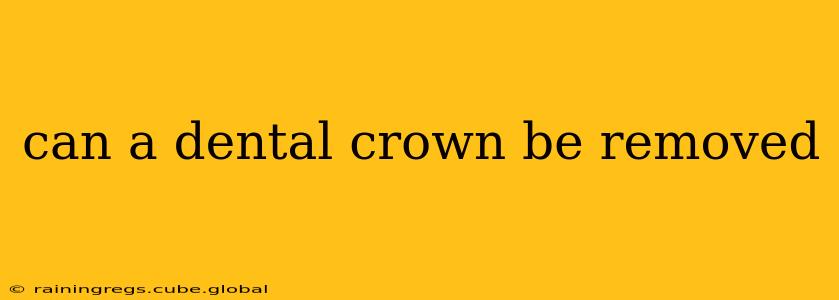Yes, a dental crown can be removed, although it's a procedure best left to a dentist or experienced dental professional. It's not a simple DIY project, and attempting removal at home can cause significant damage to your tooth and gums. This article will explore the process, reasons for removal, and what to expect.
Why Would a Dental Crown Need to Be Removed?
Several reasons necessitate the removal of a dental crown. These include:
- Crown Failure: Over time, crowns can crack, chip, or become loose. This can be due to wear and tear, decay under the crown, or trauma to the tooth. A failed crown needs replacement to protect the underlying tooth structure.
- Root Canal Treatment: If the tooth under the crown requires root canal therapy, the crown must be removed to access the tooth's interior. Once the treatment is complete, a new crown may be fitted.
- Dental Implant Placement: If a tooth needs extraction and replacement with a dental implant, the existing crown will need to be removed.
- Extensive Decay: If decay extends significantly under the crown, removal is necessary to treat the decay thoroughly.
- Gum Disease: Periodontal disease can affect the fit of a crown, sometimes requiring removal and re-cementation or replacement.
- Cosmetic Reasons: In some cases, a patient may want a different color or shape of crown, necessitating removal and replacement.
How Is a Dental Crown Removed?
The removal process typically involves the dentist using specialized dental tools to carefully break the cement bond holding the crown in place. This often involves a combination of instruments and techniques designed to minimize damage to the underlying tooth. The dentist might use:
- Dental Pick: This tool helps to gently separate the crown from the tooth.
- Crown Remover: Some dentists use specialized crown removers to help lift the crown off without excessive force.
- Ultrasonic Scaler: In some cases, an ultrasonic scaler might be used to help break down the cement.
The entire process is usually quick and relatively painless, although some patients might experience mild discomfort or sensitivity afterwards. Local anesthesia is often used to ensure patient comfort during the removal process.
What Happens After a Dental Crown is Removed?
After the crown is removed, the dentist will thoroughly examine the tooth for any damage or decay. Depending on the condition of the underlying tooth and the reason for removal, the dentist may:
- Recement the existing crown: If the tooth is healthy and the crown is still in good condition, the dentist may simply recement it back in place.
- Perform a root canal: If there's decay or infection, a root canal might be necessary.
- Prepare the tooth for a new crown: The dentist will prepare the tooth to receive a new crown, taking impressions and sending them to a dental lab.
- Extract the tooth: In some cases, the tooth might be too damaged to save, requiring extraction.
Can I Remove a Dental Crown Myself?
Absolutely not. Attempting to remove a dental crown at home is strongly discouraged. You risk damaging the underlying tooth, causing pain, infection, or even fracturing the tooth. Only a qualified dentist has the expertise and tools to remove a crown safely and effectively.
What are the Costs Associated with Crown Removal and Replacement?
The cost of crown removal and replacement will vary depending on several factors, including your location, the dentist's fees, the type of crown, and any additional procedures required (e.g., root canal). It's best to contact your dentist directly for an accurate cost estimate.
How Long Does it Take to Remove and Replace a Dental Crown?
The time required for crown removal and replacement varies depending on the complexity of the procedure. Simple removal and recementation might only take a single appointment, while more involved procedures may require several visits.
By understanding the process, reasons for removal, and potential consequences, you can work effectively with your dentist to address any crown-related concerns. Remember, always seek professional dental care for any issues with your dental crowns.
